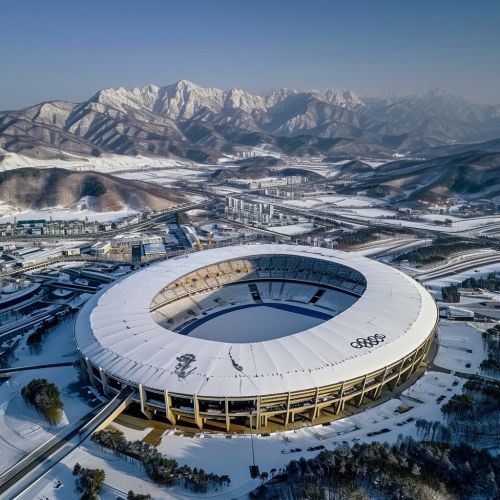2018 Winter Olympics in Pyeongchang
Overview
The 2018 Winter Olympics, officially known as the XXIII Olympic Winter Games, were held in Pyeongchang, South Korea, from February 9 to 25, 2018. The games saw 2,914 athletes from 92 National Olympic Committees (NOCs) compete in 102 events across 15 sports disciplines. This marked the first time that the Winter Olympics were held in South Korea, and the second Olympics held in the country overall, following the 1988 Summer Olympics in Seoul.


Selection of Pyeongchang as the Host City
Pyeongchang was selected as the host city for the 2018 Winter Olympics on July 6, 2011, during the 123rd International Olympic Committee (IOC) Session in Durban, South Africa. The South Korean city was chosen over Munich, Germany, and Annecy, France. This was Pyeongchang's third consecutive bid for the Winter Olympics, having narrowly lost to Vancouver, Canada, for the 2010 Games and to Sochi, Russia, for the 2014 Games.
Preparations
The preparations for the 2018 Winter Olympics involved numerous infrastructural developments, including the construction of the Pyeongchang Olympic Stadium for the opening and closing ceremonies, and the Alpensia Resort for the skiing and sliding events. The Gangneung Coastal Cluster was also developed for the indoor ice events. In addition, a high-speed rail line was constructed to connect Pyeongchang with Seoul and Incheon International Airport.
Sports
The 2018 Winter Olympics featured 102 events across 15 sports disciplines, making it the first Winter Olympics to surpass 100 medal events. Four new disciplines in existing sports were introduced in Pyeongchang: big air snowboarding, mixed doubles curling, mass start speed skating, and mixed team alpine skiing.
Participating Nations
A total of 92 NOCs participated in the 2018 Winter Olympics, a record number for the Winter Olympics. Six nations made their Winter Olympics debut: Ecuador, Eritrea, Kosovo, Malaysia, Nigeria, and Singapore. The Russian team was not officially represented due to a doping scandal, but 168 Russian athletes competed as "Olympic Athletes from Russia" under a neutral flag.
Medal Count
Norway led the medal count with a total of 39 medals, including 14 gold, 14 silver, and 11 bronze. Germany also won 14 gold medals, but fewer total medals, with 31. The host nation, South Korea, won a total of 17 medals, including 5 gold, 8 silver, and 4 bronze.
Legacy
The 2018 Winter Olympics left a significant legacy in Pyeongchang and South Korea. The event led to the development of new infrastructure, including sports venues and transportation networks, which are expected to boost the region's economy and tourism industry. However, concerns have been raised about the long-term viability and maintenance costs of these facilities.
